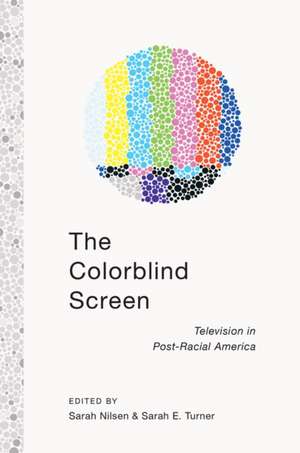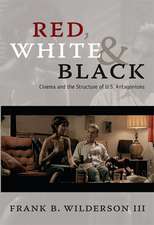The Colorblind Screen – Television in Post–Racial America
Autor Sarah E. Turner, Sarah Nilsenen Limba Engleză Paperback – 3 apr 2014
In The Colorblind Screen, the contributors examine television s role as the major discursive medium in the articulation and contestation of racialized identities in the United States. While the dominant mode of televisual racialization has shifted to a colorblind ideology that foregrounds racial differences in order to celebrate multicultural assimilation, the volume investigates how this practice denies the significant social, economic, and political realities and inequalities that continue to define race relations today. Focusing on such iconic figures as President Obama, LeBron James, and Oprah Winfrey, many chapters examine the ways in which race is read by television audiences and fans. Other essays focus on how visual constructions of race in dramas like 24, Sleeper Cell, and The Wanted continue to conflate Arab and Muslim identities in post-9/11 television. The volume offers an important intervention in the study of the televisual representation of race, engaging with multiple aspects of the mythologies developing around notions of a post-racial America and the duplicitous discursive rationale offered by the ideology of colorblindness."
| Toate formatele și edițiile | Preț | Express |
|---|---|---|
| Paperback (1) | 240.10 lei 6-8 săpt. | |
| Wiley – 3 apr 2014 | 240.10 lei 6-8 săpt. | |
| Hardback (1) | 528.99 lei 6-8 săpt. | |
| Wiley – 3 apr 2014 | 528.99 lei 6-8 săpt. |
Preț: 240.10 lei
Nou
Puncte Express: 360
Preț estimativ în valută:
45.95€ • 49.89$ • 38.60£
45.95€ • 49.89$ • 38.60£
Carte tipărită la comandă
Livrare economică 22 aprilie-06 mai
Preluare comenzi: 021 569.72.76
Specificații
ISBN-13: 9781479891535
ISBN-10: 1479891533
Pagini: 364
Ilustrații: black & white illustrations
Dimensiuni: 151 x 228 x 25 mm
Greutate: 0.37 kg
Editura: Wiley
Locul publicării:New York, United States
ISBN-10: 1479891533
Pagini: 364
Ilustrații: black & white illustrations
Dimensiuni: 151 x 228 x 25 mm
Greutate: 0.37 kg
Editura: Wiley
Locul publicării:New York, United States
Recenzii
"Acknowledging both the way that the election of President Obama became a touchstone for those who wanted to herald a post-racial America and how, in the years that followed, thinly veiled and overt racism has experienced a troubling renaissance in multiple aspects of American culture, The Colorblind Screen forces readers to question the celebratory rationalizations rampant in various corners of American media culture and to examine how race, ethnicity, and the persistence of whiteness all still matter."-Bambi Haggins, author of "Laughing Mad: The Black Comic Persona in Post Soul America"
"Collectively the essays document the dominance of colorblind ideology, which, the volume argues, has been enabling the continuation of 'racial apathy.' This volume contributes to postracial discourse and is also a valuable resource for those interested in media criticism." -, " Choice "
"Overall, The Colorblind Screen is a timely anthology that joins a small but, I hope, growing number of works that address colorblind and post-race discourses in media. This collection demonstrates the continued need to consider the central role television plays in the articulation, construction, and contestation of contemporary racial politics . . . . This collection is essential for anyone interested in exploring current racial politics and representations of racial difference in media. -, "International Journal of Communication ""
"Collectively the essays document the dominance of colorblind ideology, which, the volume argues, has been enabling the continuation of 'racial apathy.' This volume contributes to postracial discourse and is also a valuable resource for those interested in media criticism." -, " Choice "
"Overall, The Colorblind Screen is a timely anthology that joins a small but, I hope, growing number of works that address colorblind and post-race discourses in media. This collection demonstrates the continued need to consider the central role television plays in the articulation, construction, and contestation of contemporary racial politics . . . . This collection is essential for anyone interested in exploring current racial politics and representations of racial difference in media. -, "International Journal of Communication ""
Notă biografică
Sarah Nilsen is Associate Professor in Film and Television Studies at the University of Vermont. She is the author of Projecting America: Film and Cultural Diplomacy at the Brussels World's Fair of 1958.
Descriere
The election of President Barack Obama signaled for many the realization of a post-racial America, a nation in which racism was no longer a defining social, cultural, and political issue. While many Americans espouse a colorblind racial ideology and publicly endorse the broad goals of integration and equal treatment without regard to race, in actuality this attitude serves to reify and legitimize racism and protects racial privileges by denying and minimizing the effects of systematic and institutionalized racism.
In The Colorblind Screen, the contributors examine television s role as the major discursive medium in the articulation and contestation of racialized identities in the United States. While the dominant mode of televisual racialization has shifted to a colorblind ideology that foregrounds racial differences in order to celebrate multicultural assimilation, the volume investigates how this practice denies the significant social, economic, and political realities and inequalities that continue to define race relations today. Focusing on such iconic figures as President Obama, LeBron James, and Oprah Winfrey, many chapters examine the ways in which race is read by television audiences and fans. Other essays focus on how visual constructions of race in dramas like 24, Sleeper Cell, and The Wanted continue to conflate Arab and Muslim identities in post-9/11 television. The volume offers an important intervention in the study of the televisual representation of race, engaging with multiple aspects of the mythologies developing around notions of a post-racial America and the duplicitous discursive rationale offered by the ideology of colorblindness."
In The Colorblind Screen, the contributors examine television s role as the major discursive medium in the articulation and contestation of racialized identities in the United States. While the dominant mode of televisual racialization has shifted to a colorblind ideology that foregrounds racial differences in order to celebrate multicultural assimilation, the volume investigates how this practice denies the significant social, economic, and political realities and inequalities that continue to define race relations today. Focusing on such iconic figures as President Obama, LeBron James, and Oprah Winfrey, many chapters examine the ways in which race is read by television audiences and fans. Other essays focus on how visual constructions of race in dramas like 24, Sleeper Cell, and The Wanted continue to conflate Arab and Muslim identities in post-9/11 television. The volume offers an important intervention in the study of the televisual representation of race, engaging with multiple aspects of the mythologies developing around notions of a post-racial America and the duplicitous discursive rationale offered by the ideology of colorblindness."

















